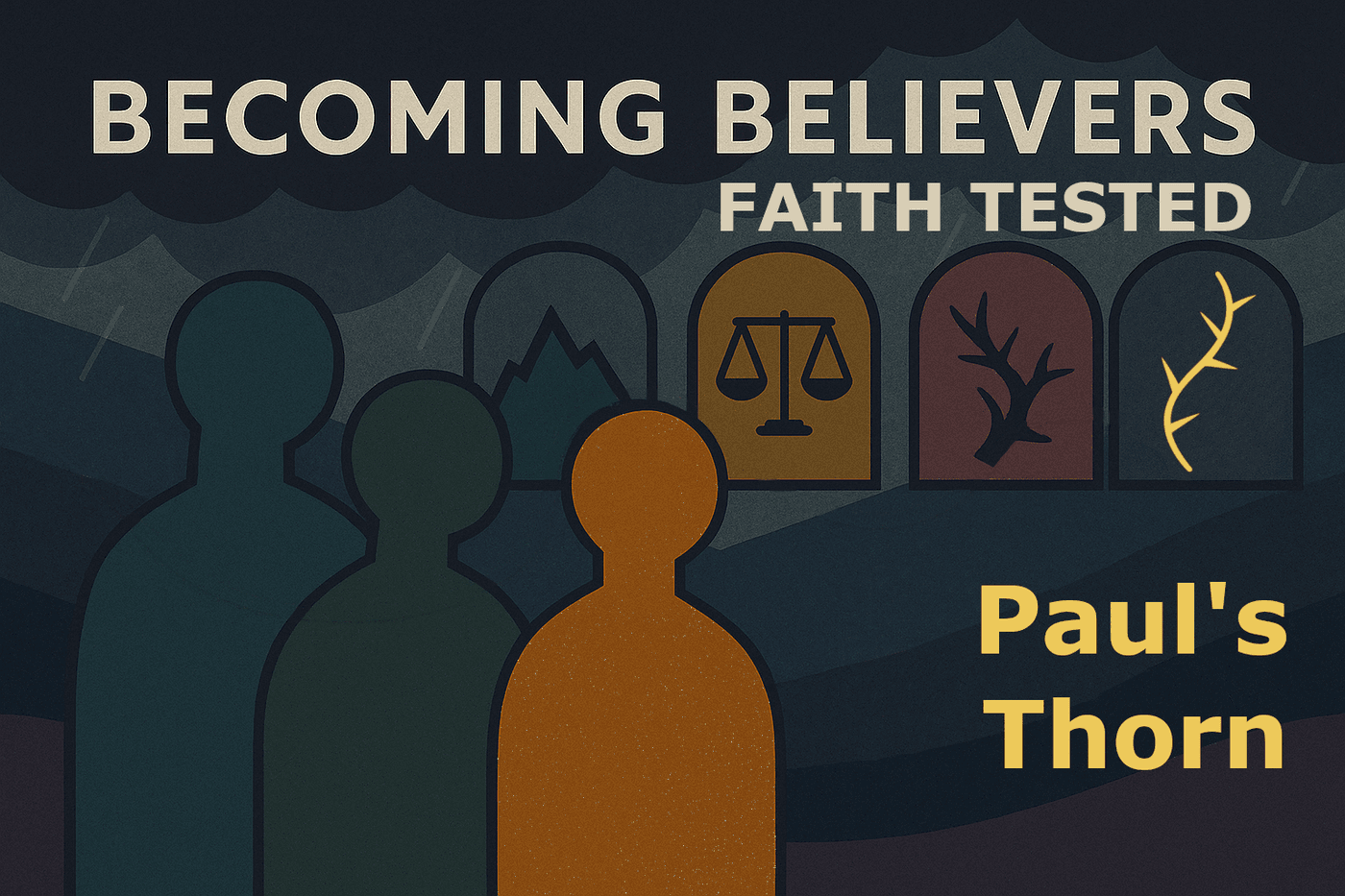Becoming Believers - Faith Tested: The Apostle Paul
Faith Tested by Weakness

The Thorn
Paul had been given a gift almost no one else could claim: he was “caught up into the third heaven,” shown visions so glorious he could hardly put them into words.
Yet in the very next breath, Paul admits something else. Alongside the visions came a thorn.
We don’t know exactly what it was. Could it have been an illness, a temptation, a persistent enemy? Theological imaginations have run wild for centuries.
But Paul is clear: it was painful, humiliating, and unrelenting. He calls it a “messenger of Satan,” and yet in the same sentence confesses that God Himself allowed it “to keep me from becoming conceited.”
This was no momentary trial. It was an ongoing weakness.
The Prayer
Paul did what any of us would do. He prayed. Not once, but three times he pleaded for God to take it away.
And why not? Couldn’t he serve God better without the thorn? Couldn’t the mission advance more smoothly if the messenger of Satan were silenced?
But God did not remove it.
Instead, Paul heard words that would change his life: “My grace is sufficient for you, for my power is made perfect in weakness.”
The Test
This was Paul’s test of faith.
He had pleaded with God for relief, and the answer was not what he hoped.
Instead of removing the thorn, God left it in place.
That is the test many of us know. You pray earnestly for healing, for clarity, for release.
You wait, fully expecting God’s deliverance, and when the weakness stays you begin to wonder: Has He heard me? Has He forgotten me?
It is here, in that long silence, that faith is pressed hardest.
Weakness feels humiliating. It slows you down, frustrates your plans, gnaws at your confidence.
Sometimes you watch others soar while you limp along, and you wonder if you are being left behind.
You may even feel the sting of shame, as if weakness itself is a sign of failure, a blot on your faith.
What makes this test so hard is that it feels like “Catch-22”; the weakness you experience requires the very strength you lack in order to overcome.
It can be a brutal test.
Yet God meets us not by erasing the weakness, but by re-narrating it.
God says, “My grace is sufficient for you, for my power is made perfect in weakness.”
The thorn is not proof of God’s neglect. In Christ, that thorn is evidence of His presence.
The weakness you carry is not your disqualification, but the very place where Christ chooses to dwell in power.
What Weakness Means for Us
Every believer has at least one “thorn” — something we have begged God to take away, but that lingers.
At some point in most people’s lives, the thorn will be physical pain, mental struggle, or an unhealed scar of the past. Dark desires that overwhelm our restraint are thorns… weakness.
Weakness is not foreign to faith; it is the crucible in which faith is tested.
The world teaches us to cover up weakness, to mask it, to call it anything but what it is.
But God tells us to confess it, even embrace it. Not to embrace the sin, but to adapt to the weakness as a catalyst for trust.
Weakness is not good in itself, but through weakness the power of Christ rests on us.
Sometimes God will strengthen your weaknesses and you will not have to struggle with them any more.
But God’s grace does not always erase weakness.
Either way, whether the thorn is removed or lasts, you will be transformed.
The thorn that humbles you may also keep you clinging to God’s sufficiency. The weakness you despise may be the very place where Christ shows Himself strong.
Passing Through, Not Passing
Like Jonah, Job, and Elijah, Paul’s test wasn’t about passing or failing. It was about passing through. His thorn remained, but so did God’s grace. And that grace was enough.
Takeaway: Weakness is not a detour from God’s plan; it is often the very path on which His power is revealed.
Prayer: Lord, in my weakness I come to You. I have asked You to take it away, and still it remains. Let me trust Your word: that Your grace is sufficient, and Your power is made perfect in weakness. Amen.



